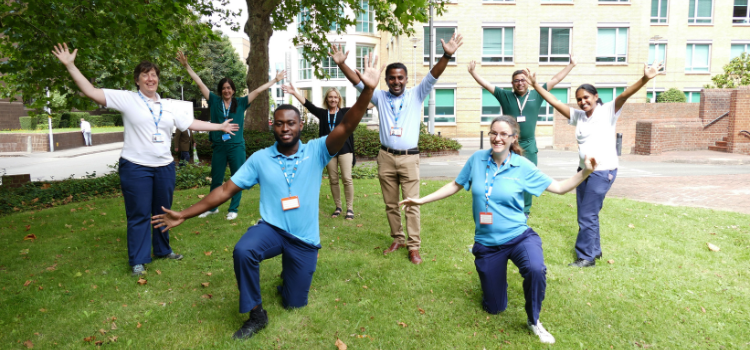Posted on: 15 May 2023
The Stroke Early Supported Discharge Team (ESD) started off as a pilot programme but this year they are now celebrating their seventh anniversary!
The team travels across Hillingdon enabling residents to continue rehabilitation therapy in their home with the same intensity and expertise as an inpatient environment.
The team is made up of therapists, rehabilitation support workers, a stroke consultant and clinical psychologist. They are specially trained to understand the needs of stroke survivors, striving for a holistic approach and standing in as a patient advocate.
The team are incredibly proud of achieving this milestone, and being able to support patient’s in such a crucial time of their post stroke journey. Let’s meet the team and hear what they say.
Kusal Das, Stroke Specialist Occupational Therapist
“We are a small team and we are very close. We are a family within the team and a family with the patients. If anybody needs support you can be assured somebody will be there. We treat the patients and look at the patient’s environment; social, financial and support networks.
For example, one of our patients has a daughter who needs psychological support so our clinical psychologist had a session with the daughter as well. We are not only looking at what has changed since the stroke but also the implications of that. It’s about supporting the patient and the family.”

ESD Team Lead Sunoj Jacob and Stroke Specialist Physiotherapist Sneha Vobilisetty
“We had a patient who was a 44-year-old. She was working full time, and a mother. All of a sudden, she had a stroke and went into hospital. She came out with issues on her left side, including both legs and a hand. She was able to walk indoors with a stick, but this wasn’t working well and she needed help to get washed and dressed as well as tasks that we take for granted, like using cutlery."
We also spoke with this patient, who told us about her journey:
"Coming back home was the best thing. I was in my own environment. They took me around the house and made sure I had everything I needed, helping to organise handrails, stools, exercise devices and showing me lots of useful techniques.
There were times I would get angry and frustrated with the situation and all the things I couldn’t do. They would keep pushing me, saying you can do this and ask me to look at what I had achieved. It has helped me become independent again. I’m looking after myself and I’m making plans for returning to driving and going back to work.
Even now, they come and see me every two or three weeks. I know if I need any help they will be there for me.”
ESD Clinical Psychologist Phil Pocock
“Experiencing a stroke can be a life changing event. Our role is to help people and their families manage what can be a scary, confusing and an anxiety provoking time. It's a privilege to help people holistically navigate this tough period. My aim is to help people realise their potential to cope and adjust to life post-stroke.”
Sneha Vobilisetty adds:
“Your spirits are high and you want to come back to work because you know the patient’s story and see the fighting spirit they have. Being in touch with the acute set up, being in touch with various organisations and also being a part of research boosts your professional development as well. It’s work that you are really passionate about, which is working with stroke survivors.”
We heard from service users on their experience of the service:
‘’The whole team were very caring and informative, guiding us every step of the way. We can’t thank them enough.’’
‘‘Very pleased, and there was great communication between the team. When there was concerns it was referred to the relevant specialist therapist who visited us and gave advice to correct these.’’
“A genuinely caring attitude from all who came to see us. Generous with their time, answering all questions. Thorough, experienced, kind.”
‘‘The entire team took great care and had the required patience not only to deal with the post-stroke issues with my mother but also be a resource to the family members and provided us much needed guidance.’’